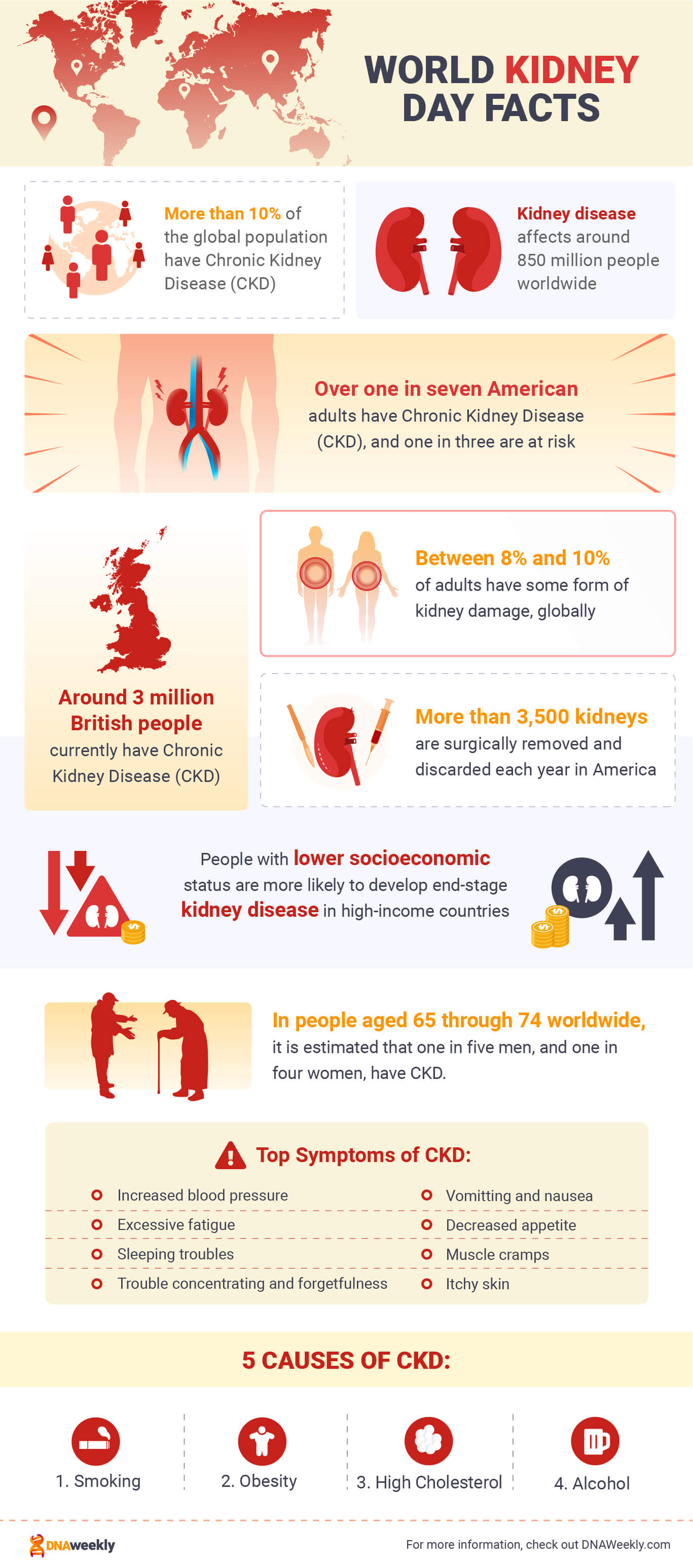
This year’s World Kidney Day will be recognized on March 12th with a multitude of events around the globe. We are marking the occasion by raising awareness of what the campaign is all about and why it is important to maintain healthy kidney function. Here’s everything that you need to know.
What Is World Kidney Day?
World Kidney Day is a global campaign that aims to educate people about kidney health. Since Chronic Kidney Disease (CKD) is a growing problem that affects people around the globe, the day is a prime opportunity to put this illness in the forefront of people’s minds. The initiative is hosted by both the International Society of Nephrology and the International Federation of Kidney Foundations.
The main objectives of World Kidney Day are to raise awareness of kidney health, motivate preventative choices, urge systematic screening around the world, inform health care professionals, and encourage transplantation as the best outcome for kidney failure.
Every year, charities, organizations, and individuals host a variety of fundraising and awareness events that help promote and extend the reach of the campaign.
The 2020 WKD Theme
This year’s World Kidney Day takes place on March 12th with the theme “Prevention to Detection.” This means that, in addition to raising awareness of kidney disease generally, the campaign will emphasize preventative interventions that can be made by both individuals and health organizations.
Risk factors for kidney disease include an unhealthy diet, hypertension, structural problems in the kidneys themselves, toxicity levels, and diabetes. While there’s little you can do about some of these risk factors, there are ways to lower your general risk, which we’ll discuss below.
In addition to individual lifestyle changes, the 2020 campaign calls for national non-communicable disease (NCD) prevention measures in every country.
Want to get involved in this year’s campaign? The official Kidney Disease Awareness color is green, so showing your support could be as simple as wearing a kidney disease ribbon in solidarity. (This might have you wondering, “what color are kidneys?!” Don’t worry! Green is just the awareness color.) You might also decide to donate money to the campaign.
Important Statistics About Kidney Disease

Keep Your Kidneys in Good Condition
Since kidney disease is such a widespread problem, keeping these vital organs working well is essential to your overall wellness. Luckily, there are small lifestyle changes you can make, including the following three ways to boost your health. Follow these kidney health tips.
1. Keep Active
Are you a gym bunny or do you shy away from physical activity? If the answer is the latter, it could be time to change your ways. Research published in the US National Library of Medicine suggests that light physical activity is associated with healthy kidney function. Whatever your current level of exercise, there’s always room for improvement, so why not think about ways to become more active in your day-to-day life?
2. Stay Hydrated
Do you drink enough water each day? Hydrating helps keep your kidneys functioning well. Moreover, recent evidence even suggests that drinking a lot of water could slow down the progression of Chronic Kidney Disease (CKD). Invest in a water bottle and carry it with you wherever you go. That way, you won’t forget to drink plenty of water.
3. Eat a Healthy Diet
Eating well is the foundation of a healthy lifestyle. Research from the American Society of Nephrology suggests that eating a healthy diet can lower your chances of developing Chronic Kidney Disease (CKD) by as much as 30%! If you’re interested in revamping your daily diet, it could be worth working with a nutritionist to devise a custom meal plan to help meet your goals.
How to Check for Kidney Disease
Now that you have a better understanding of the problem, let’s talk about what you can do to protect yourself. Putting your health first is a must, and catching the condition in its early stages could save your life. Since early diagnosis is essential, let’s look at ways to check for kidney disease and keep a clean bill of health.
Look Out for Kidney Disease Symptoms
According to national statistics, more than 37 million Americans have kidney disease. So, it may surprise you to learn that most people with this condition are completely unaware of it. For that reason, you should be continuously on the lookout for some of the most common symptoms:
Tiredness: While we all feel tired from time to time, if you’re continuously exhausted, it could be a bad sign for your health. When your kidneys fail to function correctly, they won’t filter your blood properly, which can lead to a build-up of toxins. You could struggle to concentrate or constantly feel tired, regardless of how much sleep you get.
Disrupted Sleep Patterns: On the other hand, you may want to schedule a doctor’s visit if you find it difficult to fall asleep at night, as insomnia is often a sign of kidney disease. Restless leg syndrome and the condition known as sleep apnea are also more common in people who have Chronic Kidney Disease (CKD) than in those who are generally healthy.
Increased Urination: Do you need to use the toilet more often than usual? If the filter system within your kidneys is damaged, it can cause you to urinate more frequently. If you notice this change, talk to a doctor to identify the cause. It probably won’t be kidney disease-related, but it definitely doesn’t hurt to rule it out.
Itchiness: Dry and itchy skin can be not only uncomfortable but also a sign of kidney disease. Your kidneys are in charge of maintaining the right levels of minerals in your blood, and itchiness can be a sign of bone and mineral problems, so you should get it checked.
Blood in Urine: Noticing blood in your urine can be worrying. It can be a sign that your kidneys aren’t filtering your body’s waste properly when creating urine so that some blood can leak in. If you see this, seek medical advice.
Swollen Ankles and Feed: Your kidneys are supposed to regulate your sodium levels, and sodium retention in your blood can lead to your feet and ankles swelling up unnaturally. Again, the problem may not be your kidneys, but you should try to identify the cause.
Muscle Cramps: Experiencing muscle cramps while exercising can be perfectly normal. However, electrolyte imbalances that cause muscle cramps when not exercising could indicate kidney disease.
Low Appetite: Are you feeling less hungry than usual? Although there could be many causes of loss of appetite, one often-overlooked cause could be that your kidneys are not functioning as they ought to. It’s worth seeking medical advice if your appetite wanes.
Puffy Eyes: This could be symptomatic of low protein levels in your blood, which could mean that your kidneys are filtering out too much protein, which is ending up in your urine. If your eyes are perpetually puffy for no obvious reason (e.g., lack of sleep), talk to a doctor.
Check Your Risk Levels with an At-Home Test
Looking out for warning signs is all well and good, but shockingly, you can lose up to 90% of your kidney function before noticing symptoms. Therefore, you might be interested to know that another way to take preventative action is to proactively measure your current blood and protein levels or take a DNA test to warn you of a genetic predisposition to kidney disease.
Some families seem to have more instances of kidney disease than others, and – according to the National Kidney Foundation – researchers have found more than a dozen genes that may play a role in the development of kidney disease.
To help you here, we’ve identified the best at-home tests (including DNA test kits) that tell you your genetic risk level and/or how you can adapt your lifestyle to protect your health.
Vitagene
Vitagene’s “Vitality Bundle” DNA testing kit comes with a complete health report that could help you determine how best to protect your kidney health. This could include changing your diet or taking certain supplements (such as l-arginine that supports kidneys in excretion).
EasyDNA
Best known for paternity testing, EasyDNA’s All-in-One Health Testing Package also includes health-related reports that analyze your genetic predispositions to specific conditions such as congenital adrenal hypoplasia (AHC), which affects the glands above your kidneys. Please note that this test package is not currently available in the US.
Everlywell
It’s not a DNA test, but Everlywell’s Hemoglobin A1C blood test tells you if you have high blood sugar. High HbA1c levels have been linked to cases of Chronic Kidney Disease (CKD), as well as symptoms such as sugar cravings, needing to urinate regularly, and blurred vision.
LetsGetChecked
The Kidney Test from LetsGetChecked does exactly what it says by providing a detailed report on the overall health of your kidneys. Once again, it’s a finger-prick blood test rather than a saliva-based DNA test, and it offers insights into your estimated glomerular filtration rate and the protein in your urine (urea).
5Strands
5Strands’ Deluxe Package analyses a few strands of your hair (more than 5) for weight issues, headaches, and sickness that could be symptomatic of food intolerances or kidney disease.
23andMe
can help you identify your genetic risks for more than ten common health complaints, plus your carrier statuses for congenital conditions (which you could pass onto your children). As part of your report, you’ll learn about your genetic risk of autosomal recessive polycystic kidney disease.
TellmeGen
The DNA test from tellmeGen identifies your likelihood of developing a wide array of health conditions, including Chronic Kidney Disease (CKD). It compares your risk to the average risk level for people of the same race, age, sex, and region as you.
Get Regular Checkups
At this point, you know how to look out for the signs of kidney disease. You also know that you can take DNA and other at-home tests to assess your risk. These can be more convenient than scheduling doctors’ appointments, but they’re no substitute for frequent health checks. So when your doctor invites you in for any general health checks, use them as an opportunity to discuss any kidney-related concerns you have.
The Takeaway
While World Kidney Day is just one day, it doesn’t mean you only have to worry about your kidney health once a year. Warning signs can appear at any time, and “any time” is also the right time to get tested for predispositions or contributing factors from the comfort of your own home.
More Resources
Visit these websites for more information about the important issues discussed above:
- World Kidney Day: https://www.worldkidneyday.org
- National Kidney Foundation: https://www.kidney.org
- World Health Organization: https://www.who.int/bulletin/volumes/96/6/17-206441
- National Kidney Federation: https://www.kidney.org.uk

